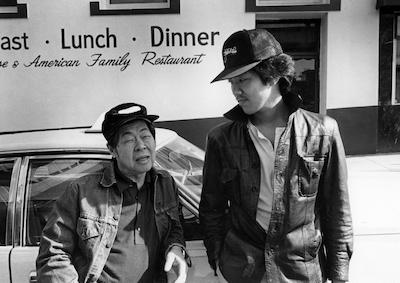New 4K restoration!
Chan is Missing
U.S., 1982
Wayne Wang’s debut feature also represents a much larger cultural milestone as the first Chinese American feature-length narrative film to achieve broad critical acclaim outside of the Asian American community. Equal parts neo-The Third Man, cultural allegory and indie comedy, Chan is Missing cracks open the doors to residences and businesses in San Francisco’s Chinatown (and, by association, all American Chinatowns) for a presentation of not just the single, unseen character of Chan Hung, but also a seldom tapped (cinematically, at least) swath of the American population. As two taxi drivers search for the illusory Chan (perhaps a real person? Perhaps a wink toward fictional detective Charlie Chan?), Wang pauses to appreciate the humor inherent in cross-cultural misunderstandings and explore the complicated history of Chinatown and its politics. Made in the golden age of American independents for a meager $22,000, Chan is Missing, added to the National Film Registry in 1995 and celebrating its 40th anniversary in 2022, is the essential entry point into Wang’s incredibly eclectic career.
DCP, b&w, in English and Cantonese with English subtitles, 80 min. Director/Editor: Wayne Wang. Screenwriters: Isaac Cronin, Wayne Wang. Cinematographer: Michael Chin. With: Wood Moy, Marc Hayashi, Laureen Chew, Peter Wang, Presco Tabios.
Original release print!
Slamdance
U.K./U.S., 1987
Named for the ’80s punk dance trend of hurtling oneself into others in a mosh pit, Wayne Wang’s third feature film is as hedonistically unhinged as its title suggests. Los Angeles-based cartoonist Charles “C.C.” Drood (Tom Hulce just two films after his star-making turn in 1984’s Amadeus) leads a life of blowing deadlines, neglecting his six-year-old daughter and attempting to reconcile with his ex-wife, all “anchored” by late nights at dance clubs. When Drood returns home one day to find his studio apartment has been burgled, he’s knocked unconscious by the culprit, instigating a whirlwind mystery wherein the audience knows about as much as our hapless victim. A lesser-known entry in the new wave noir subgenre that would make a fitting double bill with Brian De Palma’s Body Double for its command of suspense and iconic Los Angeles locations, Slamdance is also a curio as Wang’s first time directing a script he didn’t write.
35mm, color, 92 min. Director: Wayne Wang. Screenwriter: Don Opper. Cinematographer: Amir Mokri. Editor: Lee Percy. With: Tom Hulce, Mary Elizabeth Mastrantonio, Virginia Madsen, Millie Perkins, Adam Ant.






 Mobile Navigation
Mobile Navigation

